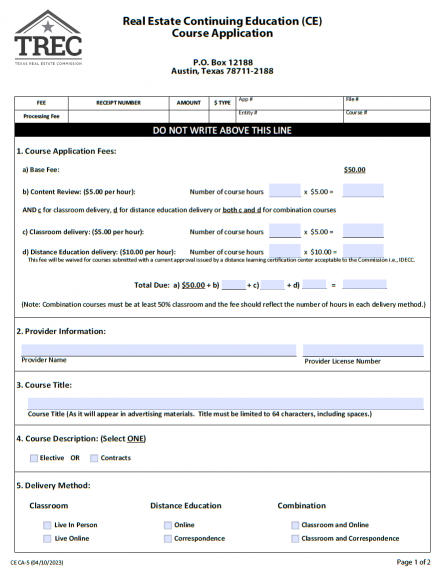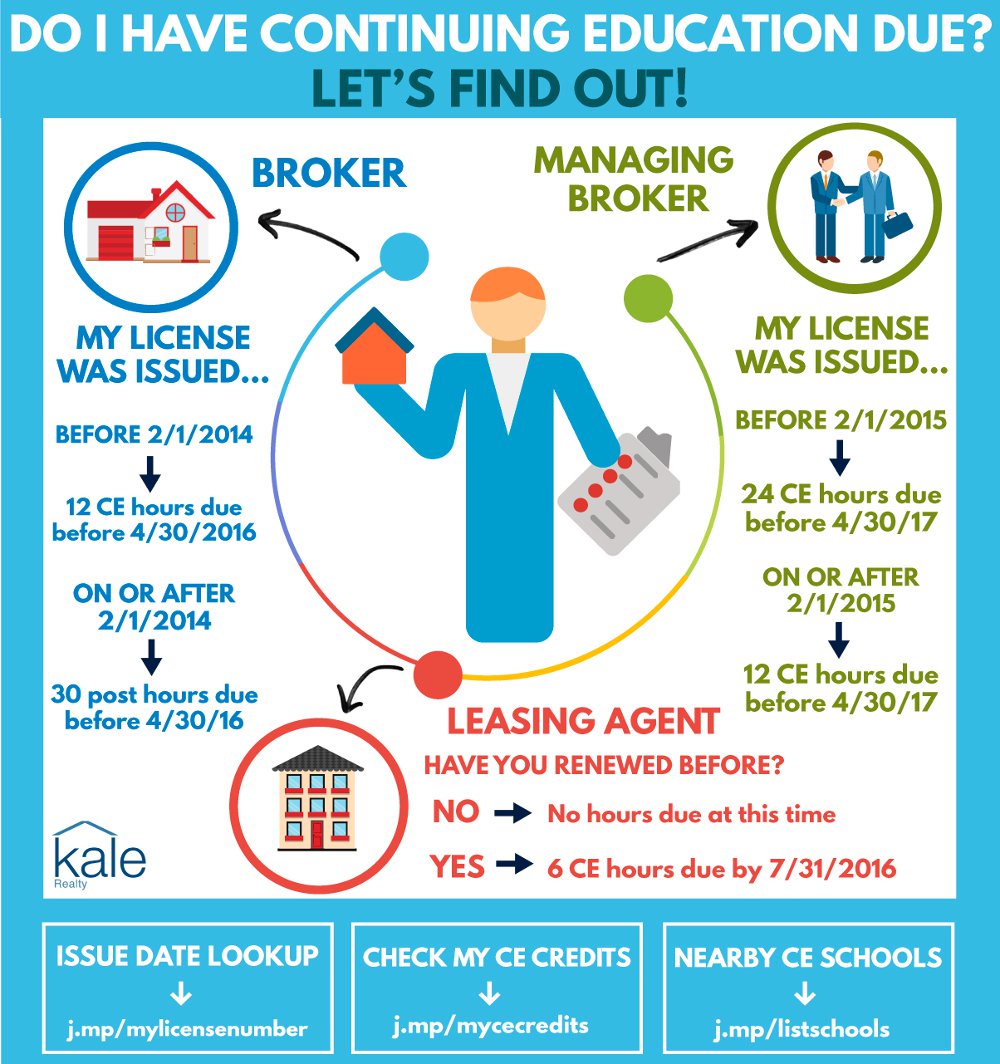Real Estate brokers must participate in continuing education to maintain their real estate licenses. These requirements are set by state laws and administered by state real estate commissions.
Agents and brokers must complete defined hours of continuing education annually to stay licensed. Real Estate broker continuing education is a crucial aspect of the real estate profession, ensuring that agents and brokers stay updated on industry regulations and best practices.
In Austin, Texas, United States, real estate professionals are required to complete a set number of continuing education hours each year. By participating in these courses, brokers can enhance their knowledge, stay ahead of market trends, and maintain their license compliance. Several reputable institutions, such as Champions School of Real Estate and Kaplan Real Estate Education, offer online courses for real estate professionals seeking to fulfill their continuing education requirements. These courses cover a range of topics essential for success in the ever-evolving real estate industry.
The Importance Of Real Estate Broker Continuing Education
In the fast-paced world of real estate, staying updated is key to success. Real Estate Broker Continuing Education plays a crucial role in ensuring brokers are equipped with the latest knowledge and skills to navigate the constantly evolving industry.
Mandatory Continuing Education Requirements
Real estate brokers are required to fulfill specific continuing education requirements set by state laws and real estate commissions. In Texas, for example, brokers must complete 18 hours of continuing education courses to maintain their licenses each year.
Benefits Of Ongoing Education
- Enhanced Skills: Regular education ensures brokers stay abreast of industry trends and best practices.
- Improved Client Service: Updated knowledge allows brokers to better serve clients and meet their needs effectively.
- Compliance: Meeting continuing education requirements ensures compliance with regulatory standards, reducing the risk of license suspension.
Finding The Best Mentor Instructors
When it comes to real estate broker continuing education, finding the best mentor instructors is crucial for success. Mentor instructors provide valuable guidance and support to help brokers stay up-to-date with industry trends and regulations. They can offer insights and real-life examples that textbooks can’t provide, making the learning experience more engaging and practical.
Qualities To Look For In Mentor Instructors
When searching for mentor instructors, consider the following qualities:
- Expertise: Look for instructors who have extensive knowledge and experience in the real estate industry. They should be well-versed in the latest market trends, regulations, and best practices.
- Effective Communication Skills: A good mentor instructor should be able to convey information clearly and concisely. They should be skilled in delivering engaging presentations and facilitating discussions.
- Approachable and Supportive Attitude: Seek out mentor instructors who are approachable and encourage open dialogue. They should create a supportive learning environment where students feel comfortable asking questions and seeking guidance.
- Reputation and Reviews: Research the reputation of potential mentor instructors. Look for reviews and testimonials from previous students to gain insights into their teaching style and the value they provide.
- Continual Learning: A great mentor instructor is someone who is committed to their own professional growth. They should stay updated on industry changes and continually seek opportunities to expand their knowledge.
Researching Mentor Instructors’ Credentials
Before selecting a mentor instructor, it’s important to research their credentials to ensure they meet your learning needs. Consider the following steps:
- Verify Licensing and Certifications: Check if the mentor instructor holds the necessary licenses and certifications required in your state. This ensures they have the legal qualifications to teach real estate continuing education courses.
- Evaluate Education and Experience: Look into the mentor instructor’s educational background and professional experience. Consider factors such as their relevant degrees, industry affiliations, and years of practical experience in real estate.
- Assess Teaching Methods: Investigate the mentor instructor’s teaching methods and resources. Do they incorporate interactive activities, case studies, or real-life examples into their lessons? Evaluate how they design their curriculum to ensure it aligns with your preferred learning style.
- Check for Industry Recognition: Determine if the mentor instructor has received any industry recognition or awards. This can indicate their expertise and dedication to providing high-quality education.
- Ask for Referrals: Seek recommendations from colleagues or industry professionals who have taken courses with the mentor instructor you are considering. Their firsthand experiences can provide valuable insights.
By considering these qualities and thorough research, finding the best mentor instructors for your real estate broker continuing education can significantly enhance your learning experience and career development.
The Role Of Mentorship In Boosting Success
When it comes to the world of real estate broker continuing education, mentorship plays a vital role in boosting success. Having a mentor can provide the guidance and support needed to navigate the challenges and complexities of the industry. Furthermore, mentorship helps in building a strong professional network that can open up new opportunities for growth and development.
Guidance And Support
Mentorship offers invaluable guidance and support throughout the journey of a real estate broker’s continuing education. A mentor, with their expertise and experience, can provide insights and advice on various aspects of the profession. From understanding complex legal regulations to mastering negotiation skills, a mentor can share their knowledge and help brokers make informed decisions.
This guidance and support can be particularly beneficial for new brokers who are just starting their careers. Mentorship can provide a roadmap to success, helping these individuals navigate the initial hurdles and challenges of the industry. By providing advice, sharing experiences, and offering encouragement, mentors play a crucial role in shaping the professional growth of real estate brokers.
Building A Strong Professional Network
In addition to guidance and support, mentorship also helps real estate brokers in building a strong professional network. Mentors, with their extensive connections and industry knowledge, can introduce brokers to key players in the field. This opens up opportunities for collaboration, partnerships, and referrals, which can significantly boost a broker’s success.
By connecting brokers with other professionals, mentors enable them to tap into a vast pool of resources and expertise. This network can be instrumental in staying updated on industry trends, accessing new listings, and getting recommendations for reliable service providers. In the highly competitive world of real estate, a strong professional network can make a world of difference.
In conclusion, mentorship plays a crucial role in boosting the success of real estate brokers in their continuing education journey. From providing guidance and support to helping build a strong professional network, mentors serve as valuable allies in the quest for professional growth and excellence.

Credit: www.trec.texas.gov
Navigating Continuing Education Resources
Approved Real Estate Ce Course Providers
Real estate agents must select from approved course providers for Continuing Education (CE).
Key providers include: School Estate, LegalZoom, Celi-EDU, Illumeo, AceableAgent, Champions School of Real Estate.
Online Courses And In-person Classes
Real estate professionals have the flexibility to choose between online courses or in-person classes for their CE requirements.
Options include live instructor support, unlimited credits, and various course lengths to suit individual preferences.
Texas-specific Continuing Education Details
When it comes to real estate broker continuing education in Texas, it’s crucial to understand the state-specific requirements and renewal processes. Let’s delve into the details of Texas-Specific Continuing Education.
Texas Real Estate Ce Requirements
In Texas, real estate agents are required to complete 18 hours of continuing education (CE) every two years. This includes legal updates, ethics courses, and elective topics relevant to the real estate industry.
Renewal Process For Real Estate Licenses In Texas
Renewing your real estate license in Texas involves completing the required CE hours, submitting the renewal application, and paying the renewal fee. It’s essential to stay up-to-date with the latest regulations to maintain an active license.
Ensure you meet the specific continuing education requirements to continue practicing as a real estate broker in Texas.

Credit: www.vaned.com
Maximizing The Benefits Of Continuing Education
Real estate brokerage is an ever-evolving industry, and staying up-to-date with the latest trends, regulations, and technological advancements is crucial for success. Continuing education for real estate brokers plays a pivotal role in enhancing professional skills, staying abreast of industry changes, and ultimately, maximizing their potential. Let’s delve into how continuing education empowers brokers to reap these benefits effectively.
Staying Updated With Industry Trends
In the fast-paced world of real estate, trends, regulations, and market dynamics evolve rapidly. Continuing education, therefore, serves as a strategic tool for brokers to stay ahead of the curve. Through specialized courses and seminars, brokers gain insights into emerging trends such as sustainable housing, digital marketing strategies, and the impact of economic shifts on the housing market. By staying updated with these trends, brokers can adapt their strategies, offer valuable insights to clients, and position themselves as industry leaders.
Enhancing Professional Skills And Knowledge
Continuing education also presents a valuable opportunity for brokers to enhance their professional skills and expand their knowledge base. Courses may cover a wide range of topics including negotiation tactics, property valuation methods, legal and ethical considerations, and technology integration in real estate transactions. By honing these skills, brokers can provide better service to clients, navigate complex transactions with confidence, and build a reputation for expertise and reliability in the industry.
Balancing Continuing Education With Work Responsibilities
Real estate brokers understand the importance of continuously enhancing their knowledge and skills through continuing education. However, finding a balance between ongoing learning and everyday work responsibilities can be challenging. It’s essential to implement effective time management strategies and seamlessly incorporate learning into daily practices to ensure professional growth without compromising work efficiency.
Time Management Strategies
When undertaking continuing education as a real estate broker, time management is crucial to maintain a productive workflow. It’s imperative to prioritize learning objectives by allocating specific time slots for studying and skill development. By setting clear goals and deadlines for course completion, brokers can effectively manage their time and avoid procrastination. Additionally, leveraging technology tools such as calendar reminders and task management apps can help in organizing study schedules and work commitments efficiently.
Incorporating Learning Into Daily Practices
Integrating learning into daily routines can significantly contribute to the successful completion of continuing education requirements. Real estate brokers can adopt practices such as dedicating a specific time each day for self-study, leveraging commute hours for listening to educational podcasts or audiobooks, and actively participating in industry-related discussions or forums during breaks. By consciously integrating learning into daily activities, brokers can effectively absorb new knowledge while fulfilling their work responsibilities.
Conclusion: Investing In Your Professional Growth
Investing in your professional growth as a real estate broker is crucial for staying updated with the latest industry trends and regulations. Continuing education not only helps you acquire new skills but also enhances your credibility, ultimately paving the way for greater success in your career.
The Long-term Impact Of Mentorship And Ongoing Education
Investing in your professional growth as a real estate broker is essential for long-term success in the industry. One key aspect of this investment is the establishment of a strong mentorship network, as well as a commitment to ongoing education. By actively seeking out mentors and participating in continuing education courses, brokers can expand their knowledge and skills, stay updated on industry trends, and enhance their ability to provide exceptional service to clients.
Committing To A Lifelong Learning Mindset
An essential component of investing in your professional growth as a real estate broker is committing to a lifelong learning mindset. This means recognizing that the learning journey does not end with obtaining a license or completing initial training. Instead, it involves an ongoing commitment to staying informed and continuously improving oneself.
By embracing a lifelong learning mindset, brokers can:
- Stay updated on the latest real estate laws, regulations, and market trends
- Enhance negotiation and sales skills
- Expand their network through professional development events and conferences
- Improve client relationships by offering expert advice and guidance
- Gain a competitive edge in the industry by staying ahead of the curve
Moreover, committing to lifelong learning can open doors to new opportunities and career advancements. In today’s rapidly evolving real estate landscape, staying stagnant is not an option. Brokers must actively seek out opportunities for growth and development to thrive in a highly competitive market.
By investing in your professional growth through mentorship and ongoing education, you are taking proactive steps towards becoming a successful real estate broker. So, embrace the power of learning, seek mentorship, and stay curious – only then will you unlock your true potential in the industry.

Credit: joinkale.com
Frequently Asked Questions
How Many Continuing Education Hours For A Real Estate Agent In Texas?
For real estate agents in Texas, 18 continuing education hours are required. These are essential for maintaining their licenses and are established by state laws.
Who Is Responsible For Setting A Policy On Continuing Education In A Real Estate Brokerage?
State real estate commissions set policies on continuing education in real estate brokerages to maintain agent licenses.
How Many Continuing Education Hours Are Required For License Renewal Every 2 Years In Texas?
Real estate agents in Texas need 18 continuing education hours for license renewal every 2 years.
Do Texas Brokers Have To Take A Broker Responsibility Class Every 2 Years As Well As Maintain?
Texas brokers are required to take a broker responsibility class every 2 years and maintain it. This is part of the continuing education requirements set by state laws and administered by state real estate commissions.
Conclusion
Elevate your real estate knowledge with specialized continuing education courses to stay ahead in the field. Stay current with industry trends and regulations through interactive and engaging learning experiences. Invest in your professional growth and unlock new opportunities in the ever-evolving real estate market.

Elaine C. Durham is a distinguished figure in the domain of new business investments, recognized for her expertise and strategic acumen in navigating the dynamic landscape of emerging ventures. With a robust educational background and a wealth of experience, Elaine has become a trusted authority in the field, contributing valuable insights to the realm of investment strategies for nascent businesses. Her professional journey is marked by a keen ability to identify promising opportunities, coupled with a shrewd understanding of market dynamics and risk management. Known for her innovative approach and successful endeavors, Elaine C. Durham stands as a beacon for entrepreneurs and investors alike, offering a wealth of knowledge on fostering growth and sustainability in the ever-evolving world of new business investments.


